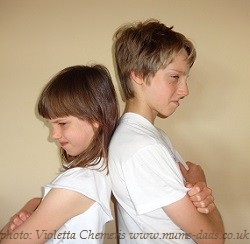It’s Not Fair!!!
 As children move out of toddlerhood, they should be starting to learn to control their anger – but between the ages of five and ten, they are still incompetent emotion managers. This means that they are still likely to find it difficult controlling and expressing their anger appropriately. The most common reasons for their anger are likely to be:
As children move out of toddlerhood, they should be starting to learn to control their anger – but between the ages of five and ten, they are still incompetent emotion managers. This means that they are still likely to find it difficult controlling and expressing their anger appropriately. The most common reasons for their anger are likely to be:
- Perceived injustice; it’s not fair!
- Frustration at being prevented from doing something that they feel qualified to do but that the parents feels they are too young for.
- Being told no; whilst they can cope better than toddlers with delayed gratification, being told they can’t have something at all doesn’t go down too well with tweenies.
- Being ‘made’ to do something they don’t want to do.
- Boundary testing; doesn’t stop when toddlerhood ends.
- Tiredness is a big factor in creating angry tweens.
- Manipulation; attempts at manipulation become more sophisticated and can depend on how successful these attempts were when they were younger.
Angry tweens lack the ability and self-control to express their anger in appropriate ways and tend to use the following techniques to demonstrate their injured feelings:
- Sulking
- Screaming
- Shouting
- Crying
- Stamping feet
- Slamming doors
- Hiding in their room
- Refusing to cooperate
- Running away
- Hitting people (especially siblings)
- Throwing things or wrecking their toys
 All this is normal but the trick to managing your child’s anger is to start to teach them more effective ways of expressing their emotions and of communicating their distress. Examples of creative techniques you can develop with them include the following:
All this is normal but the trick to managing your child’s anger is to start to teach them more effective ways of expressing their emotions and of communicating their distress. Examples of creative techniques you can develop with them include the following:
- Encourage them to draw or paint a picture to express how they feel – or of what is making them angry. This could be furious black scribbles across the page or it could be a picture of themselves or someone else. Allow them to use as many pages as they wish and to work in privacy if they want. They may want to tear the page up when they have finished or they may be happy to talk through with you what they have drawn.
- Use an anger control star chart to reward every half day that they manage to avoid an angry outburst; this encourages them to develop self-control because they can see an immediate benefit to doing so.
- Suggest that your child counts to ten (or backwards from ten to one) walks away or uses some other distraction technique when they start smouldering.
- Help them identify their own early warning signs that their anger is starting to rise and encourage them to nip the anger in the bud before it becomes a fully fledged monster that gets out of control. Early warning signs include faster breathing, tense muscles and a feeling of distress (but can vary from child to child).
- Show them that you love them even when they are in the midst of a temper tantrum and telling you that they hate you!
- Buy them a stress ball to allow some physical outlet to their anger. Or encourage them to do something energetic when they are angry – even running up and down the stairs.
- Take them for some time out whilst giving them an outlet for their excess energy by taking them for a walk, bike ride or even swim.
- Reward your child with your attention when they control their anger.
- Teach your child to breathe their anger out. Encourage them to slow their breathing down, take deep breaths, and every time they breathe out, they should imagine a little more of their anger leaving their body.
- Encourage them to write down their feelings either with a diary or just in their own words. Use the template below (you may have to help younger children to write).
- Some children can benefit from acting out stories with their toys about what has happened to make them angry; you could even have some special dolls set aside to play with in this way when they get angry.
- Give them a magazine to tear to shreds – that can be a very satisfying way to let rip the anger!
- Help them work through their feelings by asking them insightful questions about what they are thinking (such as ‘what is it about what happened that is making you so upset? Do you feel that no one is listening to you? Do you feel that we don’t care?’ etc).
- Accept and acknowledge their feelings rather than trying to dismiss them. “I don’t know why you’re so upset, it’s only a toy” is not helpful and only teaches them that their feelings are inappropriate. Teach them instead that it is OK and normal to feel angry sometimes.
- Avoid sarcasm (“Great, you’ve made a mess yet again!”), threats (“If you don’t hurry up, I’ll go without you”), labelling (“you’re so slow”) or criticism (“you’re taking forever – what are you, a baby?) when speaking to your child. In the short term these kinds of comments will just provoke your child more and in the long term they may adversely affect their self-esteem.
Finally, tell your child that everyone (even you) gets angry. Part of being a good role model is letting your children know that you are susceptible to anger, too. Let your child know about a time when you were angry and anger management helped you successfully resolve the problem in a positive way.







great tips for my firey red headed son, will try the counting and running up/down stairs first
We are just entering this stage with my eldest and boy its testing! theres some great tips here to help. thanks
Some great ideas here! I have two very strong-willed daughters and sometimes you just get so involved – it’s easy to lose sight of the more constructive ways to react!